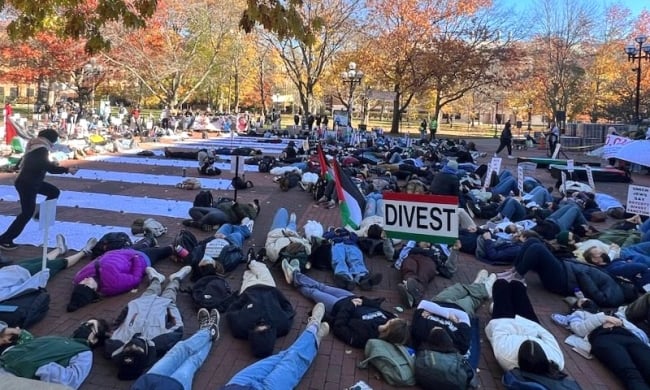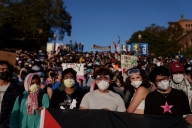You have /5 articles left.
Sign up for a free account or log in.

Student protesters at the University of Michigan are among those around the country petitioning colleges to stop investing in companies linked to Israel.
Sben Korsh
As the war between Israel and Hamas rages on, many college students sympathetic to the Palestinian cause are focusing their protest efforts on a singular goal: getting their institutions to divest from companies with ties to Israel.
The movement is not new. Pro-Palestinian student activists began pushing campuses to divest their endowments from companies with ties to Israel more than two decades ago. That push quickly evolved into the controversial boycott, divest and sanctions (BDS) movement, which has thrived on college campuses.
Those campaigns have fizzled over the years; according to a report on the online news site eJewish Philanthropy, only three U.S. college or university student governments voted on BDS resolutions in the 2022–23 academic year, compared to 44 in 2014–15. While some of the resolutions have passed, no university has actually divested from companies with links to Israel.
Now the Israel-Hamas war has reignited such efforts, with many student activists once again calling on their universities to divest from companies that do business with Israel. They argue that by investing in such companies, especially those that work with the Israeli military and government, universities are contributing to and profiting from the current destruction and loss of life in Gaza. Investments in weapons manufacturers tend to increase in times of war and the Israel-Hamas war is no exception; shares for the industry as a whole are outpacing the S&P 500. So are shares for specific companies, including RTX and General Dynamics, that supply weapons and other technologies to Israel.
At Brown University, which has one as one of the country’s most active college divestment movements, students are circulating a petition that states, “Until Brown heeds the multiple democratic demands to divest the endowment from Israel and the military-industrial complex, the university remains complicit in the ethnic cleansing of Palestine,” among other demands.
Last month, a group of 20 students from Jews for Ceasefire Now, a pro-Palestinian student group led by Jewish students, protested for divestment outside Brown president Christina Paxson’s office; they were arrested for staying in the building, University Hall, beyond its 5 p.m. closing time. The charges have since been dropped.
One of the protesters, Lily Gardner, a sophomore studying anthropology, said university leaders made clear on multiple occasions that they are unwilling to discuss the possibility of divestment—despite the fact that a university committee previously recommended divestment and students voted in favor of it in a 2019 referendum.
During the protest at University Hall, Gardner said, “we delivered our demands to all of the administrators in the building and, midway through that, we were told by admin, ‘It doesn’t matter how long you stay here, the president’s position will not change.’”
Divestment, as well as the larger BDS movement, has drawn strong backlash from opponents around the globe, who argue that the movement is based on inaccurate beliefs about the relationship between Israel and the Palestinian territories and that its ultimate goal is to dismantle the state of Israel.
“The BDS campaign does not support constructive measures to build Israeli-Palestinian engagement, nor does it promote peace negotiations or a mutually negotiated two-state solution to the conflict,” the Anti-Defamation League, a nonprofit that combats antisemitism, has posted on its website. “Rather, BDS presents a biased and simplistic approach to the complex Israeli-Palestinian conflict, positioning this dispute over territorial and nationalist claims as the fault of only one party—Israel—while ignoring other actors and dynamics such as Palestinian shared responsibility for the continuation of the conflict.”
University Reactions
Competing views on divestment can make it difficult for college officials to navigate such campaigns on campus. At the University of Michigan, a nonbinding student referendum regarding the administration’s response to Hamas’s Oct. 7 attack on Israel and the ensuing war called on the university to, among other things, create a committee to explore “the ethics of its investments and funds that feed the university’s endowment.” The referendum received significant backlash from the Michigan community and beyond; students, alumni and the university’s Hillel chapter condemned it, as did activists, diplomats and politicians all over the world.
The referendum, as well as a competing pro-Israel referendum that Michigan Hillel supported, was eventually canceled by university administrators over what they alleged was election interference by pro-Palestinian student groups, which sent a mass email to the student body encouraging them to vote for the divestment resolution. In an email announcing that the vote would not go forward, administrators noted they had waffled over whether to allow the referenda on the ballot.
“The University of Michigan received numerous calls to block, delay, or oppose two resolutions being considered by the student body under the auspices of its Central Student Government,” read the email, signed by Timothy Lynch, Michigan’s vice president and general counsel. “The University honored the request of [Central Student Government] that the University not take any of these steps. Thus, despite serious concerns about the appropriateness of putting these types of questions up to a vote by the student body, the University respected the CSG process.”
Other college presidents have expressed an unwillingness to use institutional investments to make statements.
“Brown’s endowment is not a political instrument to be used to express views on complex social and political issues, especially those over which thoughtful and intelligent people vehemently disagree,” Paxson said in 2019, after the student body voted for divestment.
But there are other factors that make it difficult for universities to divest from companies with ties to Israel.
“They have a fiduciary responsibility to maximize returns,” said Kenneth S. Stern, director of the Bard Center for the Study of Hate and the author of The Conflict Over the Conflict: The Israel/Palestine Campus Debate (University of Toronto Press, 2020). “Injecting political divisions in how you’re investing, you may be doing something that jeopardizes your prime responsibility.”
Colleges are also unable to divest from individual companies that are part of a mutual fund, hedge fund or other fund controlled by an external manager. They can only divest from companies they are directly invested in, which often make up only a small share of their total investments—and which, in many cases, as at Brown, include no defense stocks or large munitions manufacturers.
Brown’s Proposal
Campuses that have seriously explored the possibility of divestment have had to weigh a range of financial and ethical considerations.
A former member of Brown’s Advisory Committee on Corporate Responsibility in Investment Practices (ACCRIP), who requested anonymity to protect his privacy, said that the committee, which recommended divestment in 2020, previously rejected a similar proposal in 2016. (The committee, which has since been replaced by a similar body called the Advisory Committee on University Resource Management, is made up of faculty, students and alumni and can consider divesting from certain companies based on a community member’s proposal.)
Back in 2016, the former member said, the committee spent several years researching divestment. It ultimately reached the conclusion that divesting from companies with ties to Israel would require Brown also to divest from firms operating in other countries accused of human rights violations comparable to or more egregious than those Israel was accused of propagating against the Palestinians, he recalled.
“There was a consensus that Israel was held to a different and higher standard than other countries,” he said.
ACCRIP’s charter also said it could take other measures to influence companies before fully divesting, such as attending shareholder meetings to raise concerns about company business practices.
“Divestment is seen in the ACCRIP charter as the ultimate punitive measure,” the former committee member said. “You don’t go from zero to 100 without considering other steps along the way.”
Although he acknowledged that ACCRIP did vote to divest from companies with ties to Israel in 2020, he described the process as flawed; the committee only studied the issue for a total of six one-hour meetings, he said, and was not given the opportunity to discuss as a group or ask the university’s investment office even simple questions about the companies Brown is invested in.
That abbreviated process was reflected in the group’s incomplete proposal, according to a spokesperson for the university.
“This proposal could not have been implemented as written, since it did not include clear standards for identifying which companies would be subject to divestment. In addition, it did not articulate how financial divestment from the companies, however defined, would address social harm,” Brian Clark, Brown’s spokesman, wrote in an email to Inside Higher Ed.
Students who want the university to consider divestment from Israel once again can submit a proposal to the reconstituted committee, ACURM, Clark said, adding that the investment office communicated that to the student body during a town hall last week.
“Even after explaining that the endowment is not directly invested in defense stocks or large munitions manufacturers, they emphasized that ACURM is the body to explore questions of divestment,” he wrote.








